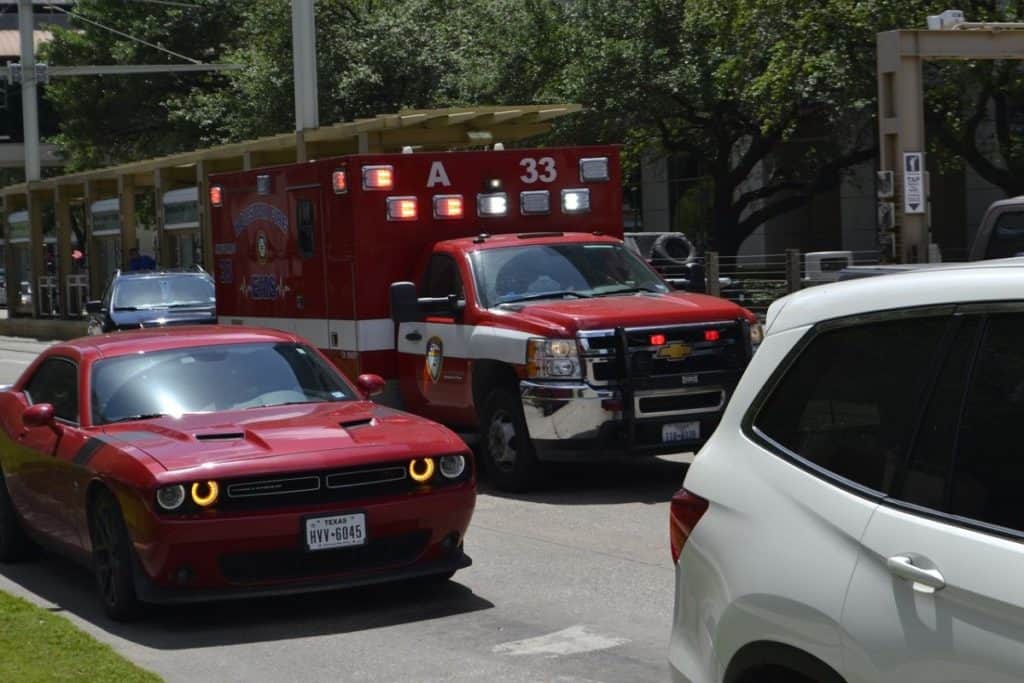EMTs and paramedics do what appear to be very similar jobs, at first glance. They’re both first responders and they both provide first aid and medical assistance, after all.
Paramedics and EMTs are both emergency medical responders, but with different levels of education, training, and tools. Paramedics are trained to start IVs, give medications, and use advanced airway management techniques, which means that the schooling is significantly longer and the testing is more difficult than basic EMT.
Let’s take a look at these differences in more detail.
Your # 1 priority is keeping your family safe. As a firefighter, I recommend everyone has updated smoke detectors that don’t require battery changes, like these ones from Kidde, a fire extinguisher, like this one from Amerex, and a fire escape ladder if you have bedrooms above the first floor, I recommend this one from Hausse.
Also read: Can You Live Off an EMT or Paramedic Salary? $$$
Educational And Experience Requirements
So, with that in mind, let’s take a look at the educational and experience requirements for both professions:
EMT – Educational and Experience Requirements
There is no need for an EMT to obtain a bachelor’s degree or an associate degree before they begin their medical training.
A high school diploma or GED equivalent is more than enough to get started, though many EMT courses will also require that a student EMT has already passed a basic CPR course – these courses tend to be offered by local educational and charitable institutions and only last for 2-3 days, they are very inexpensive.
They must then successfully complete an EMT training program at a college or vocational school. This program will, typically, last for around 150 hours.
It will consist of practical work, theoretical work and may also involve some “ride-along” with real-world EMTs.
Assuming the course is accredited by the NREMT (National Registry of Emergency Medical Technicians) then it will teach everything that an EMT needs to know in order to be able to work effectively.
Once the individual passes the EMT course, they will still be required to obtain NREMT certification before they can work as an EMT.
Also read: The Difficulty of EMT School: Is It That Hard to Pass? and How Long Does It Take to Become an EMT?
Paramedics – Educational and Experience Requirements
You do not need a college degree to start working on a paramedic’s career path. In fact, you will be expected to study and complete the basic EMT qualifications, to begin with.
It is then, generally, expected that a would-be paramedic will then do 1-2 years working as an EMT to gain enough experience in the role to progress their career with further learning.
A paramedic must then undergo 1,200-1,800 hours of further training and development which can lead to an associate degree and the program will normally require two full years of study and effort.
When a paramedic passes their college course, they too are expected to undergo certification but this time they must pass the National Paramedic Certification AND they will be required to meet the licensing requirements of whichever state they intend to work in.
As you can see, a paramedic does a lot more time in school than an EMT does when it comes to job training.
Also read: How Long Does It Take To Become a Paramedic? Expert Advice
Are EMTS Better Educated Than Paramedics?
EMTs (Emergency Medical Technicians) are not better educated than paramedics (EMT-P), well, at least, this is true when it comes to their medical training. There’s no way to judge the rest of someone’s education by their profession.
In fact, you must complete basic EMT training and be certified as an EMT before you are eligible to start a paramedic program.
In general terms, an EMT is more skilled than a first responder (EMS or EMR) but less skilled than a paramedic, though both will work as first responders.
An EMT is qualified to perform CPR, give oxygen, and carry out a range of other basic health procedures, whereas a paramedic is able to carry out more complicated medical tasks such as inserting an IV drip, giving medications, and more.
So, though they both work as part of the emergency medical services and both deliver first response support, paramedics are able to offer more advanced levels of care while moving patients to medical care facilities than EMTs can.
This video covers more about the differences:
Certification And Licensing Requirements
The certification and licensing routes for the two levels of first responder are similar but they too have their differences.
EMT – Certification And Licensing Requirements
An EMT must have certification in CPR training and most EMT courses will require the EMT to obtain this prior to further study.
This is not an expensive qualification (roughly $100) and it can be obtained in 2-3 days of study at the American Red Cross or American Heart Association. It certifies the EMT can carry out very basic CPR and First Aid techniques.
Following their program of study, the EMT must pass the program and then go on to certify with the National Registry of Emergency Medical Technicians (NREMT).
In the vast majority of the United States, this certification from the NREMT is enough for an EMT to become certified in their state to work as an EMT.
However, there are a few additional requirements for this.
Firstly, the EMT must have passed a background check to ensure they are a fit and proper person for the job and they must also be over the age of 18 and hold a current driver’s license.
The NREMT examination is not a cakewalk, either, and many EMTs require more than one attempt at the exam in order to pass it.
Also read: Is The EMT State Exam/Test (NREMT) Hard To Pass?
Paramedics – Certification And Licensing Requirements
A paramedic will usually be required to obtain all the same certifications as an EMT prior to their course of paramedic study and to have gained some experience in the field of working as an EMT too.
In addition, upon successful completion of their paramedic’s qualifications, they must then certify as a paramedic via the NREMT’s National Paramedic Certification.
Once this has been passed the paramedic may join the national registry of paramedics.
Incredibly, this does not always mean that a paramedic is licensed to practice in a given state and, in most states, (but not all) they will have to pass that state’s licensure examination too.
As you can see, there’s quite a bit more effort in getting certified to work as a paramedic too.
Also read: What Disqualifies You From Being An EMT/Paramedic?
How Often Must EMTs and Paramedics Renew Their Credentials?
Both sets of professionals must regularly renew their credentials to demonstrate that they remain up to date with best practices.
However, even here, there are slight differences between the two.
EMTs
An EMT must renew their credentials once every two years.
There are two paths they can go by to get their certificate – they may either retake the cognitive NREMT examination (which they must pass) or they can undergo a program of continuing education.
The EMT National Continued Competency Program (NCCP) is the only acceptable program of continuing education, and it requires 24 hours of credits for the individual to gain recertification.
Paramedics
Paramedics must also renew their credentials once every two years.
They too have two paths they can go by to get their certificate – they may either retake the cognitive NREMT examination (which they must pass) or they can undergo a program of continuing education.
The Paramedic National Continued Competency Program (NCCP) is the only acceptable program of continuing education, and it requires 48 hours of credits for the individual to gain recertification.
As you might have expected, by now, paramedics must do a little extra work to get recertified when compared to EMTs.
What Do Paramedics And EMTs Do After Certification?

Qualifying as a paramedic or an EMT is only half the battle, the final step for both sets of professionals is the same.
They will need to create a resume (sometimes called a CV too) and then go out and find work.
It’s a good idea to highlight all your professional skills and training on your resume, make it obvious to an employer why you are suited for the work you want, and that you are legally qualified to do so.
The Duties of EMTs And Paramedics
The duties of EMTs and Paramedics have their similarities and differences too:
EMTs
The basic duties of EMTs may include some or all of the following (depending on the exact nature of the EMT’s work):
- Helping to move patients between medical facilities
- Helping to treat and stabilize a patient when they are en route to a medical facility
- Contacting a medical facility while en route to explain the injuries/illness, the ETA and any other salient details
- Assessing patients’ needs in emergency situations
- Completing patient records effectively
- Responding to emergency call out situations where medical assistance is required
- Using restraints and backboards as necessary to help maintain a patient’s safety in transit
- Offering CPR
- Bandaging wounds as needed as well as helping control any external bleeding
- Treating and preventing shock
- Preventing further injuries and illnesses
Paramedics
The basic duties of paramedics may include some or all of the following as well as the duties carried out by an EMT:
- Stabilizing patients while transporting them for care at a medical facility
- Bandaging patients and elevating them where necessary to prevent further bleeding
- Emergency delivery of babies
- Conducting triage at emergency scenes to ensure care is given to those most severely injured first
- Carrying out tracheotomies
- Providing an IV drip to deliver infusions
- Treating collapsed lungs by using a needle in the chest
- Maintaining and creating medical records for patients as needed
- Applying pacemakers when required
- Using tubes and ventilation devices to help offer support with breathing as needed
As you can see, a paramedic may be required to deliver all of the same support as an EMT, plus many more advanced duties.
We would note that the lists above are not exhaustive for either profession and you may be called upon to take on other tasks.
Also read: Are EMTs and Paramedics Doctors? What’s the Difference?
Place Of Work For EMTs and Paramedics

Where do EMTs and Paramedics work? Well, as you probably know there’s a lot of overlap in this area but there are still some differences too.
Where Do EMTs Work?
In the main, an EMT will be employed by a private ambulance service, a government health service, a hospital, a fire department, or a police department.
Because of the relatively low amount of training that an EMT receives to become certified, they will generally work under the supervision of someone with more training. In health settings, this will be a physician or medical director.
Also read: What Jobs Can You Get With An EMT Certification? 11 Jobs
Where Do Paramedics Work?
You can, of course, find a paramedic pretty much everywhere that you find an EMT.
However, because paramedics are more highly skilled (and as we shall see in just a few moments, also more highly financially rewarded) than EMTs, they tend to be outnumbered by EMTs.
You will also find paramedics working for air ambulances (that is in helicopters and other aircraft that are used specifically for moving people from one medical facility to another) and in the fire service.
Paramedics are best represented within the emergency medical services which are their largest employers.
Also read: Do Firefighters Have to Be Paramedics or EMTs?
Salary Differences Between EMTs and Paramedics
There is a huge variety in salaries paid to EMTs and to those paid to paramedics within each profession.
So, for example, an EMT might make between $36,000 and $48,000 a year in a medium-sized city but might make less (or more) elsewhere.
And a paramedic might make between $53,000 and $77,000 a year in a similar city but again could make less (or more) elsewhere.
However, the data are clear about one thing. On average, a paramedic, no matter where they are based in the United States, will earn about $20,000 more than an EMT with a similar amount of on-the-job experience.
Also read: Can Firefighters Make 100k Per Year? True Salaries
Related Articles
How Much Does It Cost To Become An EMT or Paramedic?
How to Become an EMT: Expert Guide

